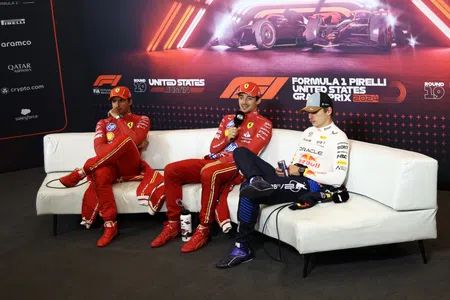During the recent Mexican Grand Prix, Charles Leclerc was penalized for swearing at an FIA press conference, a situation remarkably similar to one involving Max Verstappen earlier in the season at the Singapore Grand Prix. Both drivers used explicit language in public, yet the penalties they received were different. Leclerc was fined, with half of his penalty suspended for a year, while Verstappen faced community service as his consequence.
The incidents unfolded under strikingly similar circumstances. Leclerc used the word “fk” to describe his frustration after a close encounter with Lando Norris, while Verstappen used the word “f*ed” to describe his car’s performance in Singapore. Despite the similarities, the FIA stewards treated each situation individually, offering context on why Leclerc’s penalty was limited to a fine.
The stewards noted that Leclerc’s language stemmed from an emotional reaction in response to a specific question during the press conference. They explained that he was recalling a tense moment on the track when he struggled to keep control of his car. Upon realizing his mistake, Leclerc quickly apologized, which the stewards considered a sign of his understanding of his role as a public figure. They cited Leclerc’s immediate apology as a mitigating factor, choosing a fine rather than a harsher punishment. This fine, totaling €10,000 with half suspended, hinged on Leclerc avoiding similar offenses for the next year.
Verstappen’s case, on the other hand, lacked the same mitigating circumstances. Although he also apologized, Verstappen expressed dissatisfaction with the penalty he received and questioned the need for such measures. At a subsequent press conference in Singapore, Verstappen spoke minimally, opting to hold his own media session afterward to discuss his views more freely. He continued to express frustration over his penalty during the United States Grand Prix, arguing that the language should only be restricted when it targets someone directly, emphasizing that his statement wasn’t meant for young viewers.
The FIA stewards acknowledged that Verstappen’s use of language might be colloquial, especially as English isn’t his first language. However, they emphasized the responsibility of high-profile athletes to moderate their language in public forums. While Verstappen did apologize, the stewards noted that his behavior showed a lack of understanding of the role model responsibilities expected in such settings, leading to a different kind of penalty.
These cases underscore how the FIA evaluates each situation individually, balancing the context, intent, and immediate response of the drivers involved. Leclerc’s swift apology and regret were significant in determining his lighter penalty, while Verstappen’s ongoing resistance and comments influenced the stewards’ decision for a more community-focused punishment.

